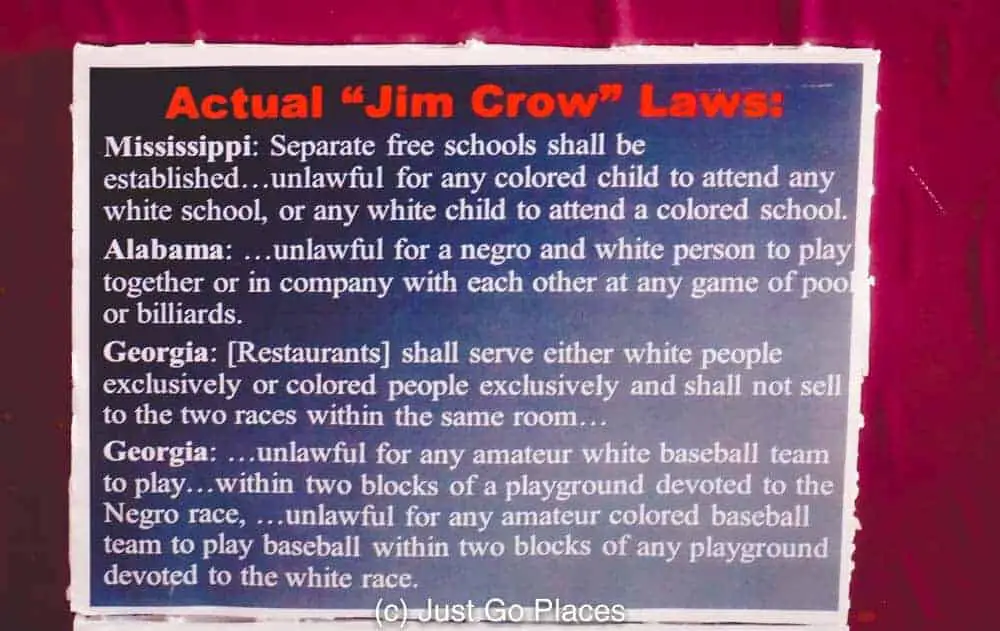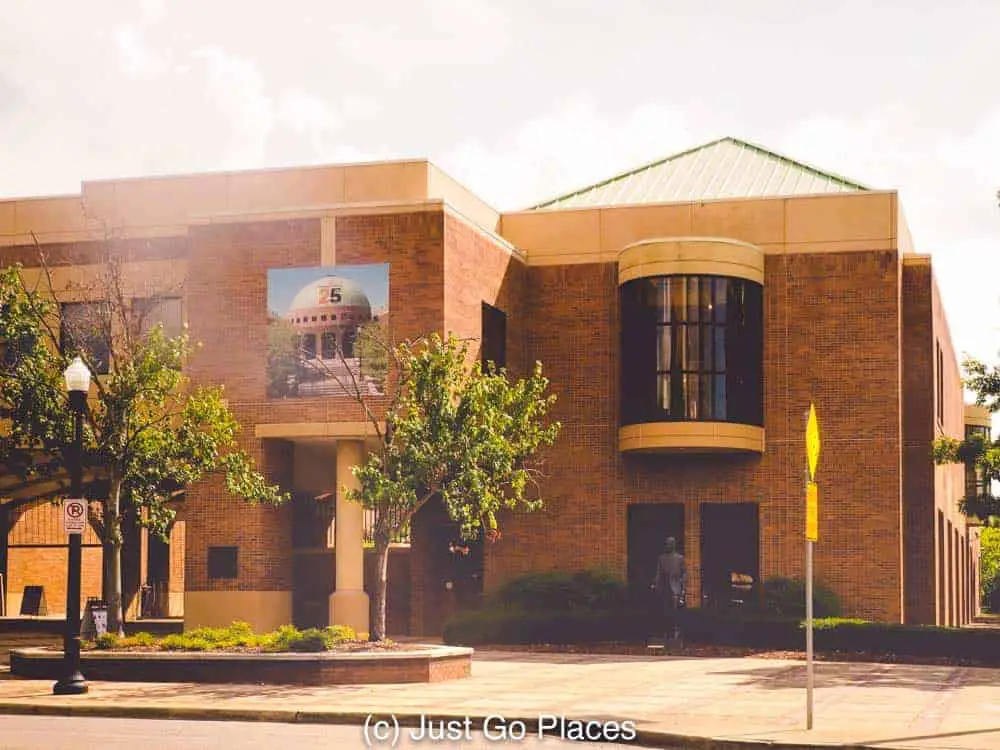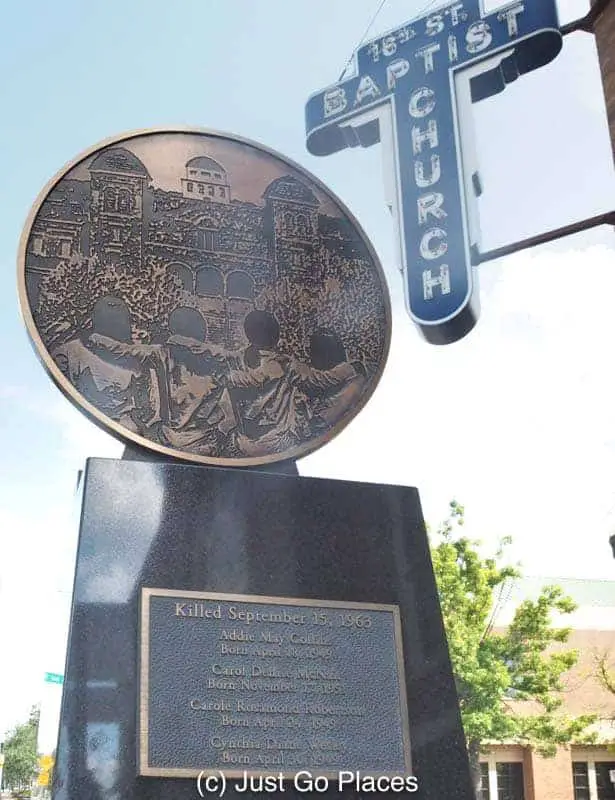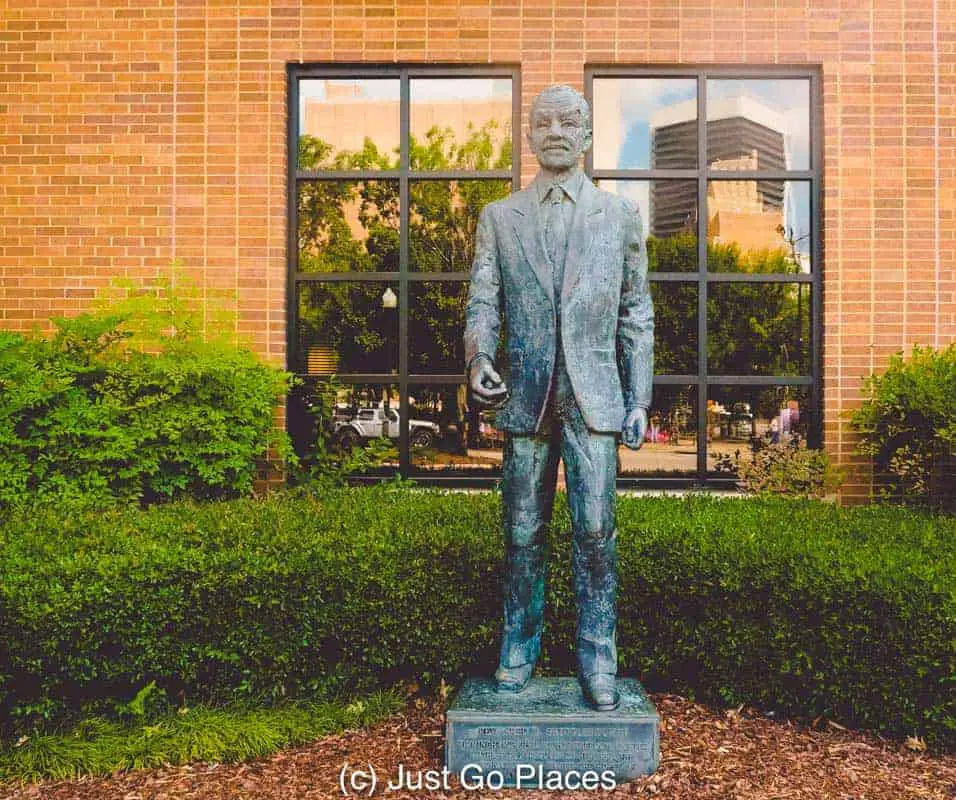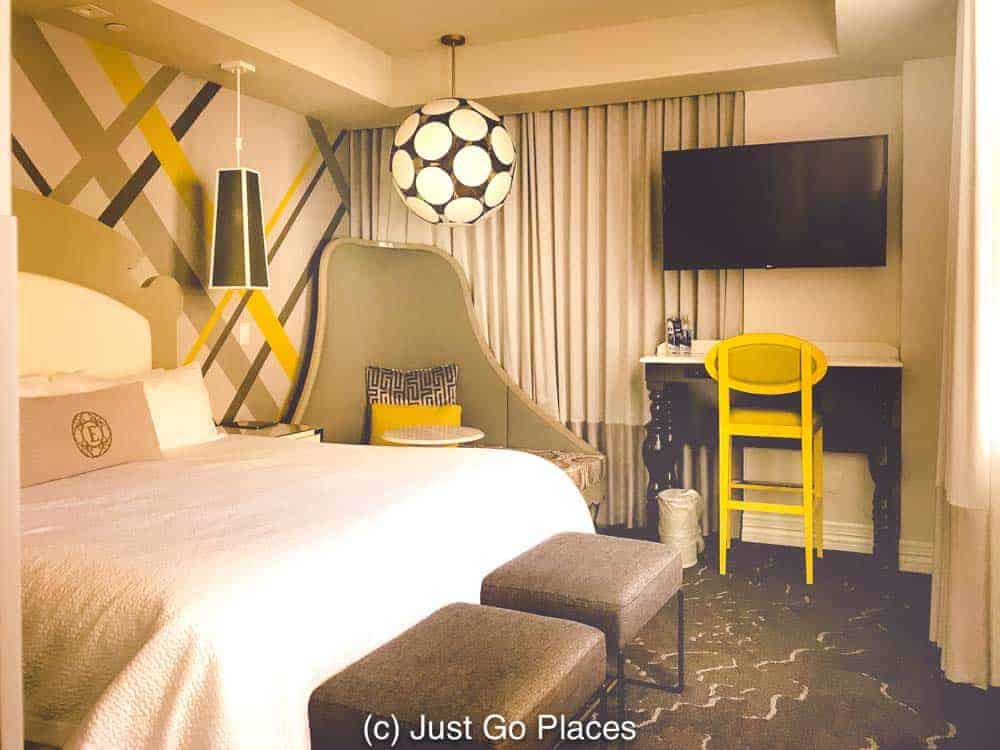On my road trip through Alabama, the Birmingham civil rights sites were a natural combination with the Montgomery civil rights sites. Even if you are not a history lover, you really must visit the Civil Rights sites in Birmingham Alabama which tells the story of how African Americans pervailed over systemic racism and changed American history forever. In 1963, by pushing for civil rights in Birmingham Alabama, the events in the Birmingham Civil Rights District led to landmark legislation that was the Civil Rights Act of 1964. Among the places to visit on a Birmingham Civil Rights Tour are the Civil Rights Institute Birmingham and the Kelly Ingram Park.
Contents
Civil Rights in Birmingham Alabama
In 1963, Birmingham was not only Alabama’s largest city but also one of the worst examples of the segregation and racial injustice that permeated the state and the region. The South may have been defeated in the Civil War but not in spirit. Southern whites just thumbed their noses at having their enslaved peoples freed by carrying on injustices like lynching and the Scottsboro Boys case.
Any attempts to change the status quo was met with violence earning the city the nickname “Bombingham” after the segregationists’ weapon of choice.
Reverend Fred Shuttlesworth of the Bethel Baptist Church invited civil rights leaders including Martin Luther King, Jr. to come to Birmingham and confront racial injustices. The stage was set was for a full-scale non-violent assault on the status quo.
The issue of civil rights in Birmingham Alabama came to a direct head thanks to Project “C” (for confrontation) which was set up by civil rights leaders to confront racial injustice directly. As part of Project C, Martin Luther King Jr. got himself arrested. He write the famous book “Letter from Birmingham Jail” on scraps of paper he found in his jail cell while in solitary confinement.
In 1963, Birmingham Alabama was crucial in catapulting civil rights issues from a regional matter onto the national stage. National outrage over the treatment of civil rights protestors in Birmingham Alabama helped the passage of the Civil Rights Act of 1964.
The Civil Rights Sites in Birmingham Alabama are part of the larger Alabama Civil Rights Trail.
Birmingham Civil Rights District
Thanks to the segregation in force in Birmingham, there was only certain areas where African Americans could live and work. There was a reason the African American business district around Fourth Avenue became the Birmingham Civil Rights District. It was here in the Fourth Avenue Business District that African Americans could do such things as shop, go to the theatre and visit restaurants freely.
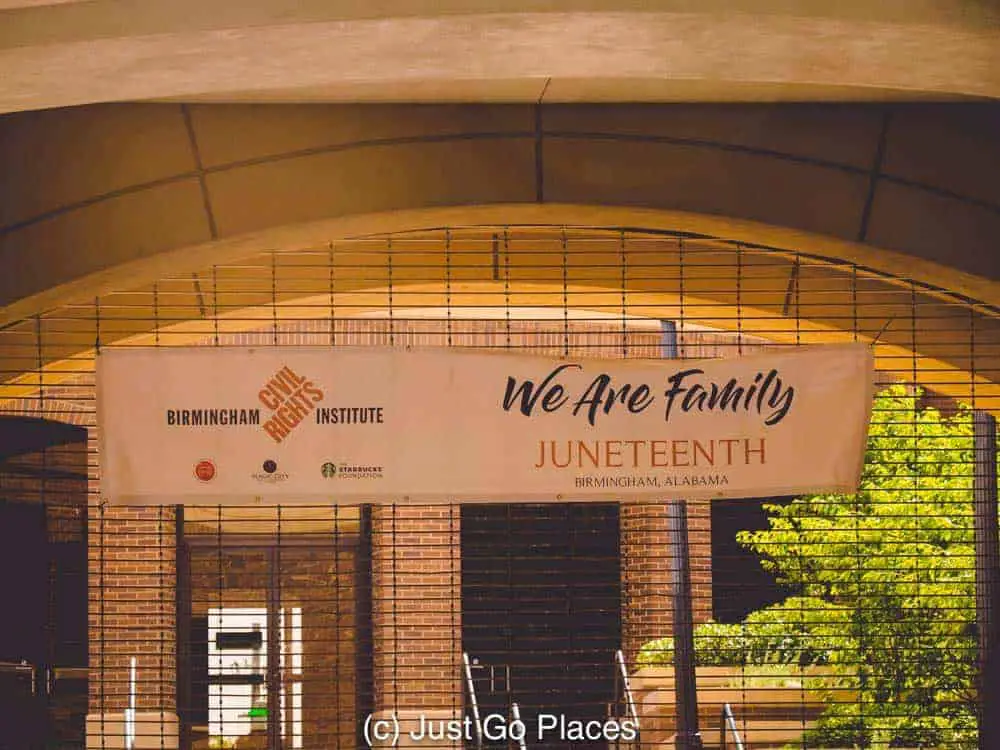
A celebration of Juneteenth at the Civil Rights Museum in Birmingham. Juneteenth is an American holiday that marks the end of slavery in the USA.
A.G. Gaston Motel
Civil Rights leaders including Martin Luther King Jr., Reverend Ralph David Abernathy and Reverend Fred Shuttlesworth created their ‘war room’ in a suite at the best hotel available to African Americans, the A.G. Gaston Motel which was located in the Birmingham Civil Rights district.
The A.G. Gaston Motel was established in 1953 by, A.G. Gaston, a successful African American businessman . Mr. Gaston had a mini-empire in Birmingham owning among other things, a bank, a radio station, an insurance company, and a funeral home for African-Americans. When Martin Luther King, Jr. was jailed in Birmingham, Mr. Gaston posted his $160,000 bail. Mr. Gaston is being honoured at the Birmingham AL civil rights museum with an exhibit starting in the summer of 2019.
The A.G. Gaston Motel is currently closed to the public because it is undergoing renovation. Plans call for the motel to be open to visitors by 2020.
The A.G. Gaston Motel was right near the 16th Street Baptist Church and Kelly Ingram Park – the Birmingham Civil Rights District after all was squeezed into a six city block area.
The Birmingham Civil Rights Sites National Monument
The Birmingham Civil Rights District includes a national monument designation of several Birmingham Civil Rights sites. National monument status protecting these Civil Rights Sites in Birmingham Alabama under the auspices of the National Park Service was granted by President Obama through an executive order during his last days in office in January 2017.
The Birmingham Civil Rights National Monument includes the Civil Rights Institute Birmingham, Kelly Ingram Park, the 16th Street Baptist Church, the A.G. Gaston Motel and the St. Paul United Methodist Church. Located outside of downtown a short drive away is the Bethel Baptist Church Birmingham.
The downtown Civil Rights Sites in Birmingham Alabama are located near each other. They make an easy Birmingham AL Civil Rights walking tour that could be visited in a few hours.
Civil Rights Institute Birmingham
The Civil Rights Institute in Birmingham Alabama has had more than 2 million visitors since opening in 1992. The ginormous 58,000 square foot Civil Rights Institute in Birmingham Alabama has archives, galleries, exhibition space, meeting rooms and administrative offices.
This Birmingham Civil Rights Museum is a repository of the documentation of the civil rights struggles of the 1950’s and 1960’s. Videos and multimedia exhibits really bring the struggle for the Civil Rights in Birmingham Alabama and elsewhere to life. For example, you have a burned out Freedom Rider Bus as well as the armoured vehicles brought into disperse the peaceful civil rights protestors.
The Birmingham AL civil rights museum is located at 520 16th Street North, Birmingham Alabama 35203. The Civil Rights Museum in Birmingham is open Tuesday through Sunday and closed Monday. Check out the website for the Civil Rights Institute Birmingham for specific events and opening hours.
Check out the great TripAdvisor Reviews of the Civil Rights Institute Birmingham.
Kelly Ingram Park
The Kelly Ingram Park statues show scenes from the 1963 civil rights movement in Birmingham- high pressure water hoses and attack dogs let loose on peaceful protestors and school children jailed for wanting basic rights.
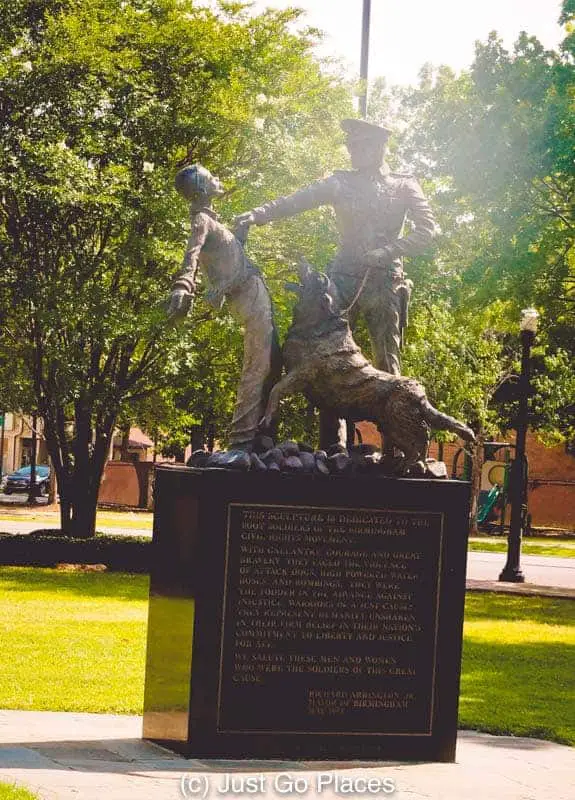
This Kelly Ingram Park statue of a police officer and his attack dog is the most photographed statue at the park.
On the second of May of 1963 groups of 100 children who had been trained at nearby 16th street Baptist Church left Kelly Ingram Park to march to City Hall singing “We Shall Overcome”. Nearly 1000 children were promptly arrested and jailed.
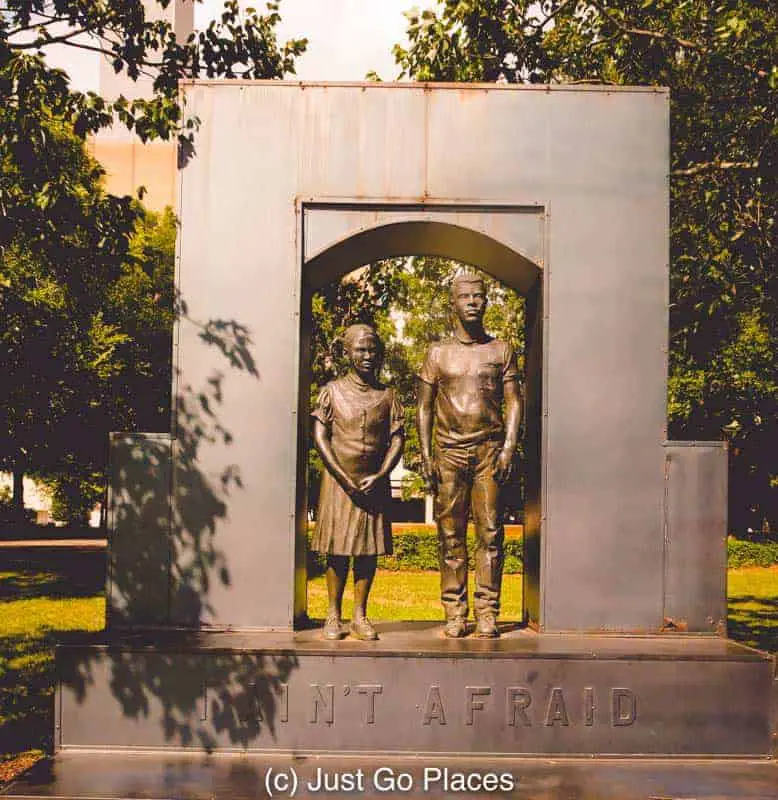
Children were recruited into the struggle for Civil Rights in Birmingham Alabama … and were also thrown in jail by the authorities.
On the third of May of 1963, more African American children showed up at Kelly Ingram Park to march and were met with high pressure water hoses and German Shepherd police dogs.
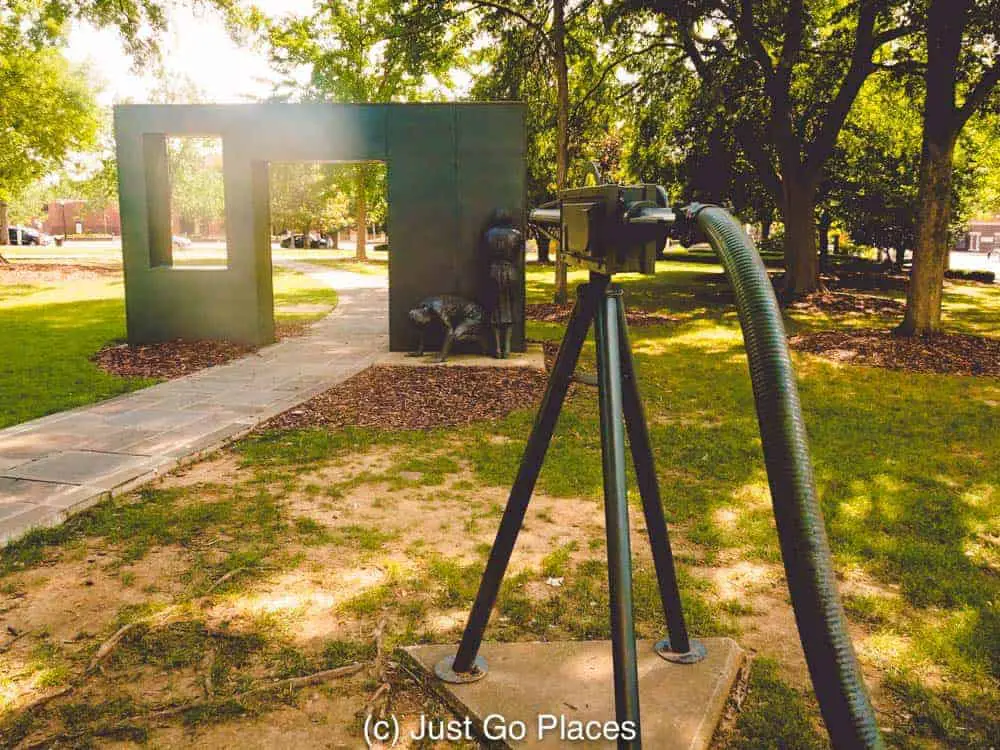
A Kelly Ingram Park statue that commemorates how powerful water guns were trained on peaceful protestors in the struggle for civil rights in Birmingham Alabama
The violence broadcast by the National News cameras shocked Americans. President Kennedy proposed what would become the Civil Rights Act of 1964. To underscore the support for this legislation, a quarter of million people showed in Washington, D.C. where Martin Luther King, Jr. gave his famous “I have a dream” speech.
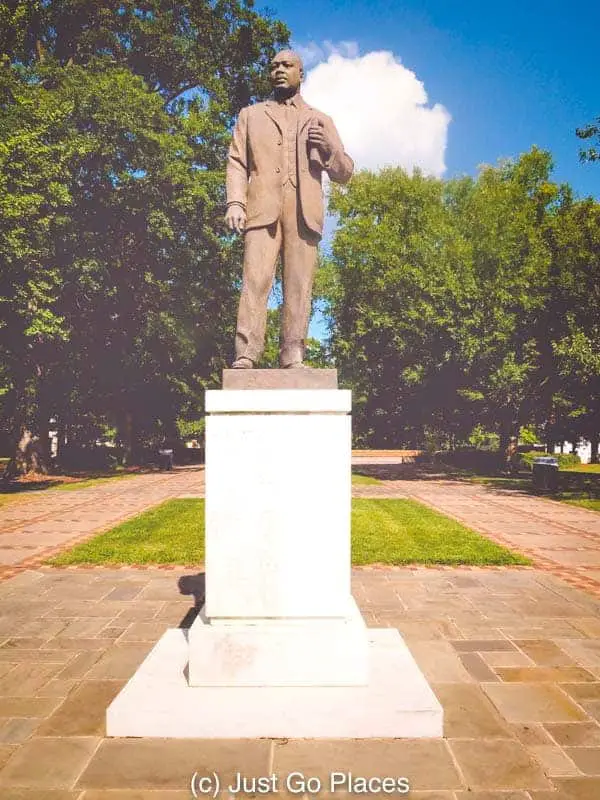
A statue of Martin Luther King, Jr at Kelly Ingram Park, one of the places to visit on Birmingham Civil Rights Trail
Baptist Church Birmingham
The 16th Street Baptist Church Birmingham was the site of an act of domestic terrorism by the Klu Klux Klan that shocked the nation.
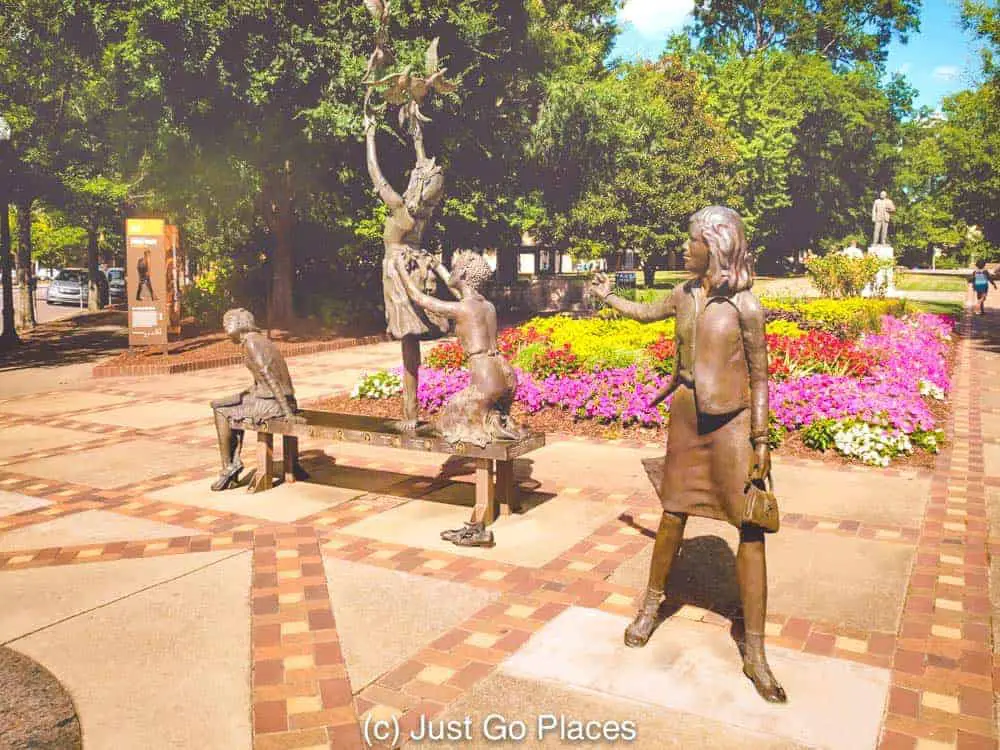
A statue to the four girls killed in the 16th Street Baptist Church Birmingham bombing at the corner of Kelly Ingram Park facing onto the church itself.
At this baptist church, Birmingham African Americans endured a bombing at a Sunday service which injured 22 people and killed four little girls. Martin Luther King Jr. lead the eulogy at the funeral of the little girls. In 2013, President Obama gave a Congressional Gold Medal to the four girls which is kept at the Birmingham AL Civil Rights Museum.
Thanks to the tragic events at this Baptist Church Birmingham has suggested it for UNESCO World Heritage status.
Other Birmingham AL Civil Rights Sites
Another member of the Birmingham Civil Rights National Monument located downtown is the St.Paul United Methodist church. This church was also a site of mass meetings and civil disobedience training for civil rights demonstrators in 1963.
Eminent Civil Rights leader Reverend Shuttlesworth was the pastor at Bethel Baptist Church Birmingham Alabama. This church is located in the Collegeville neighbourhood outside of downtown Birmingham.
Although Reverend Shuttleworth had been preaching against the injustice suffered by African Americans in Birmingham throughout the 1950’s, his ingenious idea to invite the star power of Martin Luther King to Birmingham made all the difference in 1963. Along with national attention came the hatred of the racists – the Bethel Baptist Church Birmingham was bombed three times in the 1060’s.
The Bethel Baptist Church Birmingham is included in the Birmingham Civil Rights National Monument and has been proposed as a UNESCO World Heritage Site.
Where To Stay on a Birmingham Civil Rights Tour
I stayed at the Elyton Hotel in downtown Birmingham which was a short distance to the Birmingham Alabama civil rights sites in the Birmingham Civil Rights District. Part of Marriott’s Autograph Collection, this boutique hotel is fashioned from a former bank building. In addition to the fantastic location, the hotel also has one of the best restaurants as well as rooftop bars in the city.
Check out the great TripAdvisor Reviews of the Elyton Hotel.
Compare prices for the Elyton Hotel and book through these search engines:
-
-
-
-
-
-
- Expedia
- Hotels.com
- Booking.com
-
-
-
-
-
SPREAD THE WORD! PIN THIS TO YOUR TRAVEL PINTEREST BOARDS FOR FUTURE REFERENCE!
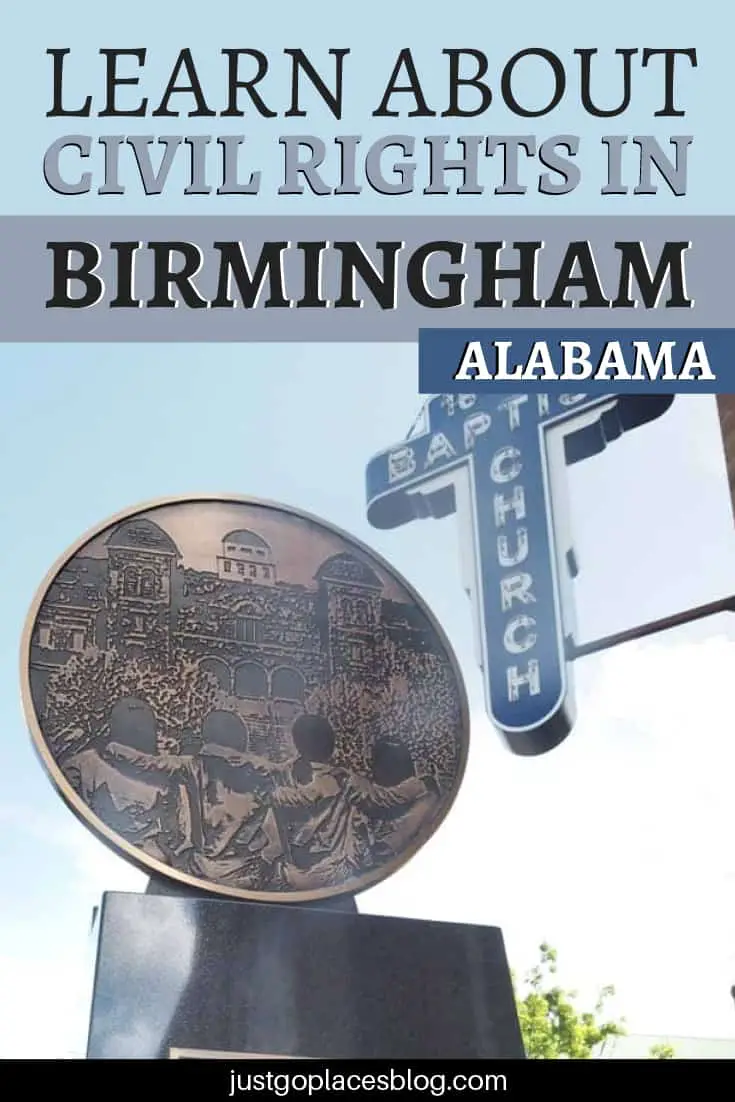
On my road trip through Alabama, the Birmingham civil rights sites were an
unmissable stop. Check out why you need to visit the Civil Rights sites in
Birmingham Alabama to learn about the Civil Right Movements, even if you are not a
history lover. #civilrights #birmingham #birminghamal #alabama
#civilrightsmovement
We did not receive compensation of any form, monetary or otherwise, from any of the products, services, hotels etc mentioned in this article.
This site generates income via partnerships with carefully-curated travel and lifestyle brands and/or purchases made through links to them at no extra cost to you. More information may be found on our Disclosure Policy.

